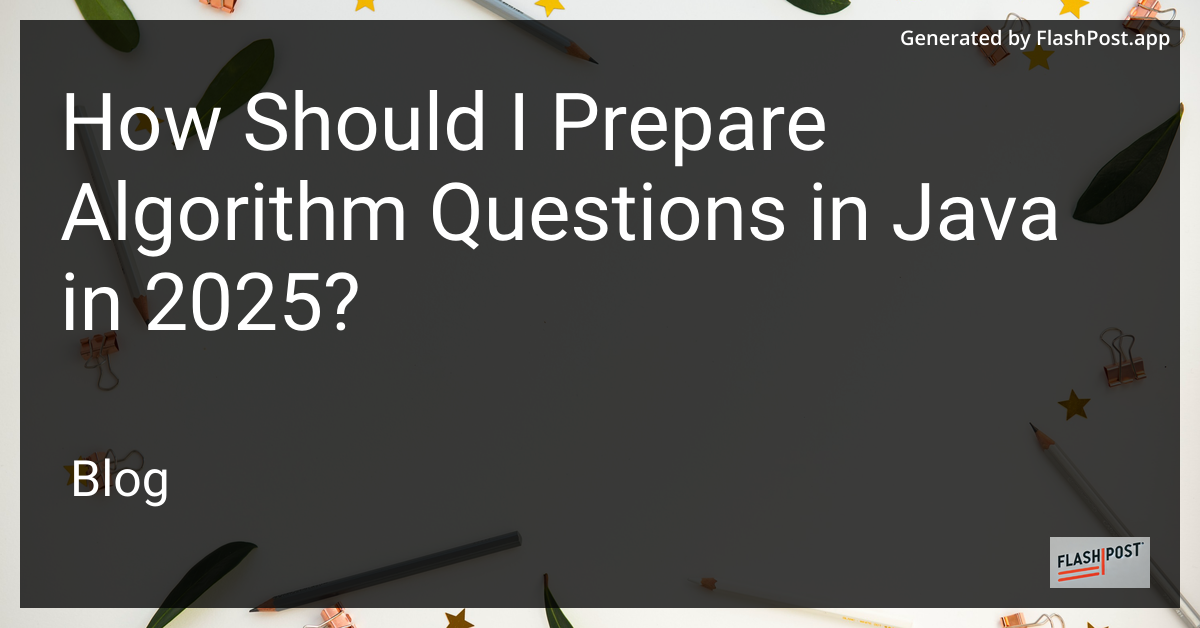
How Should I Prepare for Algorithm Questions in Java in 2025?
As we approach 2025, improving your ability to solve algorithm questions in Java is crucial for career development in the tech industry. Mastering these questions can significantly enhance your programming skills and boost your confidence during interviews. Here’s a comprehensive guide on how you can prepare effectively:
Best Programming Algorithms Book to Buy in 2025
| Product | Features | Price |
|---|---|---|
 Grokking Algorithms, Second Edition |
Buy it now 🚀  |
|
 Introduction to Algorithms, fourth edition |
- Clear, engaging explanations for complex algorithms. - Updated content reflecting the latest advancements in algorithms. - Comprehensive examples and exercises to enhance learning. |
Buy it now 🚀  |
 Algorithms (4th Edition) |
Buy it now 🚀  |
|
 A Common-Sense Guide to Data Structures and Algorithms, Second Edition: Level Up Your Core Programming Skills |
Buy it now 🚀  |
|
 50 Algorithms Every Programmer Should Know: Tackle computer science challenges with classic to modern algorithms in machine learning, software design, data systems, and cryptography |
Buy it now 🚀  |
1. Understand the Basics Thoroughly
A strong foundation in Java is essential. Ensure that you are well-acquainted with core concepts like data types, control structures, object-oriented programming, and exception handling. These fundamentals are critical when solving complex algorithm problems.
2. Master Data Structures
Data structures are at the heart of algorithms. Get comfortable with arrays, linked lists, stacks, queues, trees, graphs, and hashmaps. Understanding the strengths and weaknesses of each allows you to choose the most efficient data structures for your solutions.
3. Practice Problem Solving
Regular practice is key to success. Use platforms like LeetCode, HackerRank, and CodeSignal to practice a wide range of problems. Start with easy problems and gradually progress to more challenging ones.
4. Focus on Time and Space Complexity
An efficient algorithm isn’t just about solving the problem; it’s about solving it quickly and using minimal space. Learn how to analyze the time and space complexity of your solutions. This knowledge helps when optimizing code and discussing your approach in interviews.
5. Learn from Others
Review solutions from other programmers to understand different approaches to the same problem. This will expose you to a variety of techniques and help you think outside the box. For additional resources, explore learning integrations like using sympy with python libraries.
6. Utilize Online Resources
There are numerous online courses and tutorials available that can provide structured learning paths. Websites like Coursera, Udemy, and edX offer courses tailored for algorithm preparation.
7. Practice Writing Clean Code
In addition to solving algorithms, practice writing clean, readable, and maintainable code. This involves understanding python dataframe extraction, which can also apply principles beneficial in Java programming.
8. Screen Size Considerations for Development
Developers often work on different devices. Understanding how to manage your coding environment can be enhanced by exploring features like python tkinter display size, which can provide insights applicable to various programming environments.
Conclusion
Becoming adept at algorithm questions in Java requires consistent practice, a clear understanding of core concepts, and an ongoing effort to improve and adapt to new techniques. Equip yourself with the right tools and resources, and you’ll be well-prepared to tackle algorithm questions in 2025 and beyond.